Nano-immunotherapeutics: targeting approach as strategic regulation at tumor microenvironment for cancer treatment
Cancer is the leading cause of mortality worldwide, which necessitates our consideration related to novel treatment approach. Tumor cells at the tumor microenvironment (TME), regulate a plethora of
[...] Read more.
Cancer is the leading cause of mortality worldwide, which necessitates our consideration related to novel treatment approach. Tumor cells at the tumor microenvironment (TME), regulate a plethora of key mechanistic signaling pathways that obstruct antitumor immune responses by immune suppression, immune resistance or acquired immune tolerance. The present therapeutic regimes are provided independently or in combination, or as immunotherapies for cancer immune targeting. Immunotherapy has altered the arena of oncology and patient care. By using the host immune system, the immunostimulatory molecules can exert a robust, personalized response against the patient’s own tumors. Alternatively, tumors may exploit these strategies to escape immune recognition, and accordingly, such mechanisms represent chances for immunotherapy intervention. Nonetheless, despite promising outcomes from immunotherapies in recurrent and metastatic cancers, immune-therapeutics in clinics have been limited owing to unpredictability in the produced immune response and reported instances of immune-related adverse effects. The unrealized potential of immunotherapies in cancer management maybe due to the obstacles such as heterogeneous nature, multiple targets, patients’ immune response, specificity for cancer or variability in response generation in toxicity levels, delivery and cost related to therapeutics etc. Further revolutionary trends related to immunotherapies are noticeable with slower progress for cancer management. Recent advances in nanomedicine strategize to ameliorate the lacuna of immunotherapy as it relies on the inherent biophysical characteristics of nanocarriers: size, shape, surface charge and multifunctionality and exploiting them as first line therapy for delivery of biomolecules, single checkpoint inhibitors and for imaging of TME. Therefore, nano-assisted immunotherapies can boost the immunotherapeutic approach, overcoming factors that are with imminent potential risks related to it, thereby significantly improving the survival rate associated with it in cancer patients. Nanotechnology is anticipated to overcome the confines of existing cancer immunotherapy and to successfully combine various cancer treatment modes.
Priyanka Singh ... Anita Kamra Verma
Cancer is the leading cause of mortality worldwide, which necessitates our consideration related to novel treatment approach. Tumor cells at the tumor microenvironment (TME), regulate a plethora of key mechanistic signaling pathways that obstruct antitumor immune responses by immune suppression, immune resistance or acquired immune tolerance. The present therapeutic regimes are provided independently or in combination, or as immunotherapies for cancer immune targeting. Immunotherapy has altered the arena of oncology and patient care. By using the host immune system, the immunostimulatory molecules can exert a robust, personalized response against the patient’s own tumors. Alternatively, tumors may exploit these strategies to escape immune recognition, and accordingly, such mechanisms represent chances for immunotherapy intervention. Nonetheless, despite promising outcomes from immunotherapies in recurrent and metastatic cancers, immune-therapeutics in clinics have been limited owing to unpredictability in the produced immune response and reported instances of immune-related adverse effects. The unrealized potential of immunotherapies in cancer management maybe due to the obstacles such as heterogeneous nature, multiple targets, patients’ immune response, specificity for cancer or variability in response generation in toxicity levels, delivery and cost related to therapeutics etc. Further revolutionary trends related to immunotherapies are noticeable with slower progress for cancer management. Recent advances in nanomedicine strategize to ameliorate the lacuna of immunotherapy as it relies on the inherent biophysical characteristics of nanocarriers: size, shape, surface charge and multifunctionality and exploiting them as first line therapy for delivery of biomolecules, single checkpoint inhibitors and for imaging of TME. Therefore, nano-assisted immunotherapies can boost the immunotherapeutic approach, overcoming factors that are with imminent potential risks related to it, thereby significantly improving the survival rate associated with it in cancer patients. Nanotechnology is anticipated to overcome the confines of existing cancer immunotherapy and to successfully combine various cancer treatment modes.
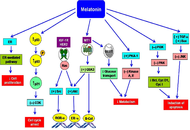 The potential anti-cancer effects of melatonin on breast cancerOpen AccessReviewMelatonin is the primary hormone of the pineal gland that is secreted at night. It regulates many physiological functions, including the sleep-wake cycle, gonadal activity, free radical scavenging, [...] Read more.Naba Kumar Das, Saptadip SamantaPublished: February 25, 2022 Explor Med. 2022;3:112–127
The potential anti-cancer effects of melatonin on breast cancerOpen AccessReviewMelatonin is the primary hormone of the pineal gland that is secreted at night. It regulates many physiological functions, including the sleep-wake cycle, gonadal activity, free radical scavenging, [...] Read more.Naba Kumar Das, Saptadip SamantaPublished: February 25, 2022 Explor Med. 2022;3:112–127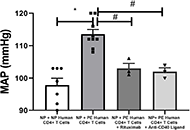 Placental CD4+ T cells from preeclamptic patients cause autoantibodies to the angiotensin II type I receptor and hypertension in a pregnant rat model of preeclampsiaOpen AccessOriginal ArticleAim: Preeclampsia (PE) is a hypertensive disorder of pregnancy associated with activated CD4+ T cells and autoantibodies to angiotensin II type 1 receptor (AT1-AA). We have previously [...] Read more.Kristin E. Reeve ... Babbette LaMarcaPublished: February 25, 2022 Explor Med. 2022;3:99–111
Placental CD4+ T cells from preeclamptic patients cause autoantibodies to the angiotensin II type I receptor and hypertension in a pregnant rat model of preeclampsiaOpen AccessOriginal ArticleAim: Preeclampsia (PE) is a hypertensive disorder of pregnancy associated with activated CD4+ T cells and autoantibodies to angiotensin II type 1 receptor (AT1-AA). We have previously [...] Read more.Kristin E. Reeve ... Babbette LaMarcaPublished: February 25, 2022 Explor Med. 2022;3:99–111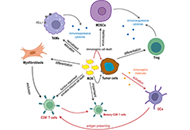 Multi-faced roles of reactive oxygen species in anti-tumor T cell immune responses and combination immunotherapyOpen AccessReviewT cells play a central role in anti-tumor immunity, and reactive oxygen species (ROS) lie at the crossroad on the anti-tumor T cell responses. To activate efficient T cell immunity, a moderate level [...] Read more.Tao Wang, Haiyan XuPublished: February 25, 2022 Explor Med. 2022;3:77–98
Multi-faced roles of reactive oxygen species in anti-tumor T cell immune responses and combination immunotherapyOpen AccessReviewT cells play a central role in anti-tumor immunity, and reactive oxygen species (ROS) lie at the crossroad on the anti-tumor T cell responses. To activate efficient T cell immunity, a moderate level [...] Read more.Tao Wang, Haiyan XuPublished: February 25, 2022 Explor Med. 2022;3:77–98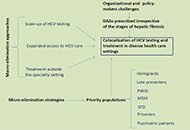 Elimination of hepatitis C virus infection in Europe: targeting the obstaclesOpen AccessEditorialDante RomagnoliPublished: February 24, 2022 Explor Med. 2022;3:71–76
Elimination of hepatitis C virus infection in Europe: targeting the obstaclesOpen AccessEditorialDante RomagnoliPublished: February 24, 2022 Explor Med. 2022;3:71–76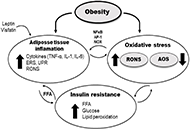 Oxidative stress in obesity and insulin resistanceOpen AccessReviewSince obesity is one of the main factors in the development of insulin resistance (IR) and is also associated with increased oxidative stress (OxS) rate, this study aims to review the published lite [...] Read more.Anastasija Panic ... Esma R. IsenovicPublished: February 23, 2022 Explor Med. 2022;3:58–70
Oxidative stress in obesity and insulin resistanceOpen AccessReviewSince obesity is one of the main factors in the development of insulin resistance (IR) and is also associated with increased oxidative stress (OxS) rate, this study aims to review the published lite [...] Read more.Anastasija Panic ... Esma R. IsenovicPublished: February 23, 2022 Explor Med. 2022;3:58–70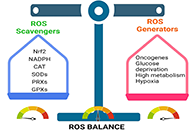 Reactive oxygen species in cancer progression and its role in therapeuticsOpen AccessReviewThe redox status in pathogenesis is critically regulated by careful balance between the generation of reactive oxygen species (ROS) and their elimination. Increased ROS level above the cellular tole [...] Read more.Ranjeet Singh, Partha Pratim MannaPublished: February 22, 2022 Explor Med. 2022;3:43–57
Reactive oxygen species in cancer progression and its role in therapeuticsOpen AccessReviewThe redox status in pathogenesis is critically regulated by careful balance between the generation of reactive oxygen species (ROS) and their elimination. Increased ROS level above the cellular tole [...] Read more.Ranjeet Singh, Partha Pratim MannaPublished: February 22, 2022 Explor Med. 2022;3:43–57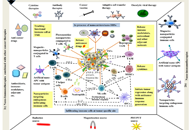 Nano-immunotherapeutics: targeting approach as strategic regulation at tumor microenvironment for cancer treatmentOpen AccessReviewCancer is the leading cause of mortality worldwide, which necessitates our consideration related to novel treatment approach. Tumor cells at the tumor microenvironment (TME), regulate a plethora of [...] Read more.Priyanka Singh ... Anita Kamra VermaPublished: February 16, 2022 Explor Med. 2022;3:22–42
Nano-immunotherapeutics: targeting approach as strategic regulation at tumor microenvironment for cancer treatmentOpen AccessReviewCancer is the leading cause of mortality worldwide, which necessitates our consideration related to novel treatment approach. Tumor cells at the tumor microenvironment (TME), regulate a plethora of [...] Read more.Priyanka Singh ... Anita Kamra VermaPublished: February 16, 2022 Explor Med. 2022;3:22–42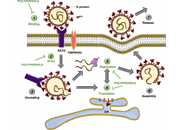 Preclinical toxicity test results of a new antiviral–immune-modulator compound consisting of flavonoid molecules (COVID-19 clinical trial preliminary data)Open AccessOriginal ArticleAim: Isolated specific glycone–aglycone conjugated flavonoids which are investigated for their effect of bioavailability and molecular concentrations. The specific formula is then tested [...] Read more.Gürer G. Budak ... Orkun TarkunPublished: January 18, 2022 Explor Med. 2022;3:1–21
Preclinical toxicity test results of a new antiviral–immune-modulator compound consisting of flavonoid molecules (COVID-19 clinical trial preliminary data)Open AccessOriginal ArticleAim: Isolated specific glycone–aglycone conjugated flavonoids which are investigated for their effect of bioavailability and molecular concentrations. The specific formula is then tested [...] Read more.Gürer G. Budak ... Orkun TarkunPublished: January 18, 2022 Explor Med. 2022;3:1–21